旅游英语第01章
unit1 旅游英语
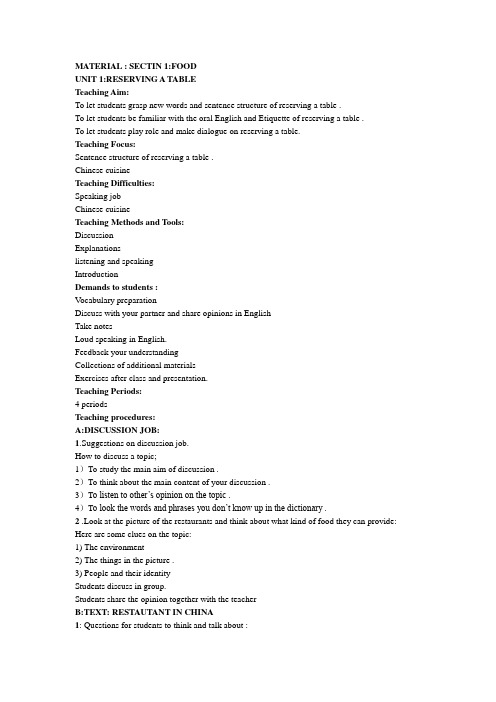
MATERIAL : SECTIN 1:FOODUNIT 1:RESERVING A TABLETeaching Aim:To let students grasp new words and sentence structure of reserving a table .To let students be familiar with the oral English and Etiquette of reserving a table .To let students play role and make dialogue on reserving a table.Teaching Focus:Sentence structure of reserving a table .Chinese cuisineTeaching Difficulties:Speaking jobChinese cuisineTeaching Methods and Tools:DiscussionExplanationslistening and speakingIntroductionDemands to students :V ocabulary preparationDiscuss with your partner and share opinions in EnglishTake notesLoud speaking in English.Feedback your understandingCollections of additional materialsExercises after class and presentation.Teaching Periods:4 periodsTeaching procedures:A:DISCUSSION JOB:1.Suggestions on discussion job.How to discuss a topic;1)To study the main aim of discussion .2)To think about the main content of your discussion .3)T o listen to other’s opinion on the topic .4)T o look the words and phrases you don’t know up in the dictionary .2 .Look at the picture of the restaurants and think about what kind of food they can provide: Here are some clues on the topic:1) The environment2) The things in the picture .3) People and their identityStudents discuss in group.Students share the opinion together with the teacherB:TEXT: RESTAUTANT IN CHINA1: Questions for students to think and talk about :What do you think about Chinese food ? do you like it or not ?Why are Chinese food so popular in the world ?What kind of Chinese food do you like best ? why ?4) Talk about the main idea of the test.2: Text presentation :Para 1: Restaurant in chinaPara 2: Guangdong foodPara 3: Sichuan foodStudents read and translate the text into Chinese paragraph by paragraph .3.Some words explaining and sentence structure :Individual :single ,separatelyLikely: probably;Typical roadside eateries :particular type of characteristic.Base on : base historical event this book is believable .;Court: official resident of a soveneigt Reputation :fame ;Blend :mix ;Refine :carefully selected ;Ingredients ;materialRefreshing : give some new taste to ..;Adapt : to make sth suitable for new …Flavoring :taste ;Be famous for :be noted for ;Be well-knownDistinct: easily to seen or to understand .3.Exercise on text:Questions on the text .Translation .C.LISTENING AND SPEAKING JOB:1.Dialogue : listen to the recording and finish the dialogue.2.Memorization: memorize the dialogue and practice it with your partner3.Role play:Situation 1In a group of three or four ,work out a restaurant reservation form first by yourselves and then play different roles as waiter /waitress and guests to make reservation in a restaurant .Situation 2You are an American ;you want to hold a farewell party in a Chinese restaurant Beihai restaurant .on Friday evening for 10 people .make a reservation in a restaurant .Students do the role play job to practice the sentence structure.D.CULTURAL NOTES ADDITIONAL KNOWLEDGE:1.Etiquette of reserving table serve:GreetingAsking the reservation timeTo know under whose name the reservation is ?The number in the partyTo know the kinds of dishes reserved.To see if there are any special requestsConfirmationThanks and goodbyeE:HOMEWORK:1.To recite the sentence structure of this unit2.To do the exercises on the notebook3.To prepare for the new unitMATERIAL: SECTIN 1:FOODUNIT 2: RECEIVING GUESTTeaching Aim:To let students grasp new words and sentence structure of receiving guests .To let students be familiar with the oral English and the etiquette of receiving guests .To let students play role and make dialogue on receiving guests .Teaching Focus:Sentence structure of receiving guests .Chinese dinner table etiquetteTeaching Difficulties:New words and expressionsRole play fobTeaching Methods and Tools:DiscussionExplanationslistening and speakingIntroductionDemands to students :V ocabulary preparationDiscuss with your partner and share opinions in EnglishTake notesLoud speaking in English.Feedback your understandingCollections of additional materialsExercises after class and presentation.Teaching Periods:4 periodsTeaching procedures:A:DISCUSSION JOB:1 .Look at the picture of the restaurants and think about the following topics:Why would the gests want different seating position in a restaurant ?For convenience , for a quiet place , for a good view , they like smoke ,To be undisturbed ,want to danceNow you guests are facing a long wait in line in our restaurant .discuss with your partner what you can tell your guests to help them avoid the wait and what they can do while waiting the following are your references :How can you avoid the long lines at popular theme restaurant ?What should you do if faced with a long wait ?2.Students discuss .3.Students show their opinion.B:TEXT: RESTAUTANT IN CHINA1: Questions for students to think and talk about :Generally ,how many people reserve table when they plan to eat out ?Have you any idea about reserve a table via internet ?2: Text presentation :Para 1: The new alternative to call-ahead seating .Para 2: Double your exposure.Para 3: Affiliate restaurant .Para 4: Advanced seatingPara 5: Cell phone confirmation.Students read and translate the text into Chinese paragraph by paragraph .3.Some words explaining and sentence structure :PDA: personal digital assistant ;Advanced seating ;Confirm v :to make surePromptly adv quickly ; View ,n; Zip codeHome page :from the very beginning of ;Affiliate ,v members of ; Hostess, nDatabase ,n a collection of figures ;Monitor ,n ; Insert ,vApporopriate :suitable ,right or proper.; Alternative to :substitute of sthEg :Have you find any alternative way to punishing him ?;Advance : before the timeVia : by the way through; Eg: I can send him a letter via e –mailConfirmed : to make sure ; Seated ; to be seatedUnlike : not like; Eg: They are so unlike that nobody believe they are twinsHis latest novel is quite unlike his earlier work.Frustration : complex ;Allow … to …; Eg: Nobody is allowed to touch this book .Multiple : many kinds or types of ;Add to Eg; I have nothing to add to my earlier statement ; Lost to : be defeated ; fail to do Appropriate ;suitable ;right to do ; and proper ;Prior to : coming before in time; Eg: you should go into the classroom prior to the teacher .3.Exercise on text:Questions on the text .Translation .C.LISTENING AND SPEAKING JOB:1.Dialogue : listen to the recording and finish the dialogue.2.Memorization: memorize the dialogue and practice it with your partner3.Role play:situation 1 : two walk in guests come to your restaurant at pesk hours they need to wait at least 15 minutes .Explain to them and take to them to the lounge .then seat then at a table neat the danve floor .Situation 2: A couple come to your restaurant without a reservation .They want to sit by the third floor window to table a nice view .But that table has been booked .your guests really want to dine at that table because it is the place where they met for the first time .Make arrangement for them . Students talk about how to do the discussion job and finish the dialogue .Students do the role play job in pairs using the sentences in the references .D.CULTURAL NOTES ADDITIONAL KNOWLEDGE::1.food and eating etiquette :Family MealsThe Stuff of the MealPlace Settings and Serving EtiquetteWho Eats When and HowWhile EatingRules for DrinkingAccompanimentsPaymentE:HOMEWORK:1.To recite the sentence structure of reserving guests .2.To be familiar with the cultural notes .3.To prepare for the new unitMATERIAL : SECTIN 1:FOODUNIT3:TAKING ORDERSTeaching Aim:To let students grasp new words and sentence structure of taking orders..To let students remember the name of the popular dishes in China and in Gansu province . To let students play role and make dialogue taking orders..Teaching Focus:sentence structure of taking orders..Chinese cuisine and Chinese dishes and Gansu dishes .Teaching Difficulties:Speaking jobChinese cuisine and Chinese dishes and Gansu dishesTeaching Methods and :DiscussionIntroductionExplanationslistening and speakingDemands to students :V ocabulary preparationDiscuss with your partner and share opinions in EnglishTake notesLoud speaking in English.Feedback your understandingCollections of additional materialsExercises after class and presentation.Teaching Periods:4 periodsTeaching procedures:A:DISCUSSION AND INTRODUCTION JOB:1.Suggestions on discussion job.2. Look at the picture of the restaurants and talk about the dishes in the picture ;Red cooked eggplantFried crabs in chilli saucesKungpao chickenStudents discuss the dishes and report the conclusion3.look at the following vegetables and name them:Tomato spinach cucumber turnip broccoli red cabbageLettuce squash mint potato sproutsGarlic carrot peas radish okraOnion cauliflowers mushroom string beans4.DVD show :the etiquette of food service:Students read the vegetables and recite the vegetablesB: TEXT :TRY THE ANTHENTIC FOOD.1: Questions for students to think and talk aboutHow much do you know about chinese famous dishes ,can you list some of them?How much do you know about Gansu popular dishes ?Why chinese cuisine is a part of chinese culture?2: Text presentation :Para 1:Try the authentic food .Para 2: Food and chinese culturePara 3: Famine and hardshipPara 4: Energy savingStudents read and translate the text into Chinese paragraph by paragraph .3.Some words explaining and sentence structure :Differ from ; Eg :The climate is differ from north to south in china .Trying out ;Eg : He just got a new bike and now he is trying out ,At all levels of society :people from all walks of lifeFair : quite ; Mental : about mind ,the process of thinkingWell being :the state of feeling health and happy ; Combine : exist together ;join togetherPlay a large role : Luxun play a large role in the history of literature of china .Edible : fit to be eaten ; Lean: poor harvest year ; Turn out to be : to become toPrompted : urge to ,incite ; Current: of the present time ; Conserve : keepDelights: give great pleasure satisfaction happiness3.Exercise on text:Questions on the text .Translation .C.LISTENING AND SPEAKING JOB:1.Dialogue : listen to the recording and finish the dialogue.2.Memorization: memorize the dialogue and practice it with your partner3.Role play:Situation 1 : work in a group of three or four and work out a menu together ,then play different roles as waiter and customers to take orders in a restaurant .You can decide whether it is chineses or westernSituation 2: you are waiter of a Chinese restaurant .your take is to recommend the specialty like ma pod u fu to your group mates who just arrived in china .Students do the role play job in pairs using the sentences in the references .D.CULTURAL NOTES ADDITIONAL KNOWLEDGE:1.Introduction on Chinese cuisineChinese food enjoys a high reputation in the world also for its sheer abundance. It is due to the diversity of the climate, products and customs that there are widely different food styles and tastes in local regions.Beijing cuisine ;Shandong Cuisine; Sichuan Cuisine ;Guangdong Cuisine ;Fujian Cuisine ;Jiangsu CuisineJ;Zhejiang Cuisine;Hunan Cuisine2. Introduction on Gansu cuisine and Dunhuang cuisine:Gansu famous cuisine:金鱼发菜兰州烤小猪核桃丸子百合桃兰州八宝百合玛瑙海参油爆驼峰Dunhuang cuisine:The new 8 Chinese cuisine of local style雪山驼掌九色鹿河西花馍荷香蒸羔羊3.Introduction on chinese and west dinner:Western breakfast, western lunch,and western dinnerChinese breakfast, Chinese lunch and Chinese dinnerE:HOMEWORK:1.To recite the popular chinese dishes and Gansu dishes:2.To recite the role play job of taking orders .MATERIAL: SECTIN 1:FOODUNIT 4: BEVERAGESTeaching Aim:To let students grasp new the main beverages in china and western .To let students play role and make dialogue of introducing beverages.Teaching Focus:Words of beveragesTo Introduce beveragesTeaching Difficulties:Words of beveragesTeaching Methods :DiscussionIntroductionExplanationslistening and speakingDemands to students :V ocabulary preparationDiscuss with your partner and share opinions in EnglishTake notesLoud speaking in English.Feedback your understandingCollections of additional materialsExercises after class and presentation.Teaching Periods:4 periodsTeaching procedures:A:DISCUSSION JOB:1.Suggestions on discussion job.2. Look at the picture .Do you know the following wines ?discuss with in your group about their producing areas and tastes .Wines:Bordeaux., Chablis, Chianti, Lambrusco, Liebfraumilch, Muscadet, Rioja, Sauternes,3.Discuss with your partner the beverage menu in Chinese restaurant ?.What are some of the item an the beverage list ,Is it classified into soft and alcoholic drinks ?What are the items of each type? Students discuss the dishes and report the conclusion.Students discuss in group.Students share the opinion together with the teacherB: TEXT THE ART OF WINE.1: Questions for students to think and talk about:What is usually included in a restaurant’s ‘drink list”?What do chinese people drink at dinner ?How much do you know about tea ?2: Text presentation :Para 1: Wine listPara 2-4: Old World wine and New World winePara 5: Wine and serving temperature .Para 6: Wine and food .Students read and translate the text into Chinese paragraph by paragraph .3.Some words explaining and sentence structure :Generally speaking :Available :that can be used or obtained.By means of :with the help of ; by using sthBring out: show sth clear ,reveal sth ;As to :regarding to ;As well:Worth mention :;In other words ;As to ;Is combine with ;Are supposed toAnd so on ; Students take notes on the presentation of the text .3.Exercise on text:Questions on the text .Translation .C.LISTENING AND SPEAKING JOB:1.Dialogue : listen to the recording and finish the dialogue.2.Memorization: memorize the dialogue and practice it with your partner3.Role play:Situation1: You are a restaurateur .with the help of a sample beverage list ,work out a beverage list of your own.Situation2: You are a waiter /waitress in a restaurant .your guests want you to recommend some drinks to go with their dishes .your guests ordered lobster ,prawn and some other seafood, give them some suggestions .Think of other kinds of dishes that your guests might order and what drinks to suggest .Students do the role play job in group using the sentences in the references .D.CULTURAL NOTES ADDITIONAL KNOWLEDGE:1.Introduction on cold non alcoholic drinksSoda , Sirups, Water ,Fruit Juices, Beers, Coffee,Tea2.Introduction on wine :Aperitifs, Whisky, Cocktails, Aperitifs, Cognac, Gin, Vodka, Rum ,Korean Soshu Japanese sake3.Chinese tea and tea culture:The Categories of TeaChina's Tea-Producing AreasAdvantages of Tea-DrinkingTea ProductionTea artE.HOMEWORK:1.To recite beverages2.To introducing beverages after class .MATERIAL : SECTIN 1:FOODUNIT 5: PAYMENTTeaching Aim:To let students grasp new words and sentence structure of payment.To let students understand the words and sentence structure of payment.To let students play role and make dialogue of paying.Teaching Focus:Sentence structure of payment .Teaching Difficulties:The sentence structure of payment .Role play jobTeaching Methods and :DiscussionIntroductionExplanationslistening and speakingDemands to students :V ocabulary preparationDiscuss with your partner and share opinions in EnglishTake notesLoud speaking in English.Feedback your understandingCollections of additional materialsExercises after class and presentation.Teaching Periods:4 periodsTeaching procedures:A:DISCUSSION AND INTRODUCTION JOB:1.Suggestions on discussion job.2. Look at the picture of coins: How much do you know about the following :Penny , cent , nickel, dime, a quarter,3.Do you know the following cards?Are the following acceptable in your restaurant ?1: Questions for students to think and talk about:What is usually included in a restaurant’s ‘drink list”?What do chinese people drink at dinner ?How much do you know about tea ?Students discuss in group.Students share the opinion together with the teacherB: TEXT WHO WILL PAY THE BILL.1: Questions for students to think and talk about:How do you think about the chinese etiquette of payment ?What do you know about the western etiquette of payment ?2: Text presentation :Main idea of the text: The chinese custom of paying for the billStudents read and translate the text into Chinese paragraph by paragraph .3.Some words explaining and sentence structure :Foot :be responsible for paying the cost of ; Issue :send out /make something knownIn the first place : first ;End up :end ; Eg: If you continue to steal you will end up in prison .Encounter :meet ,have the kind of chance .; Stand treat : to be the host .For some reason ; Convincingly : make somebody certain / cause to realizeIf they can help it : if it is possibleDeclaring that you will pay will not save you from this battle :;Save :means set somebody free . Determined to do : decided to do something successfully ; Eg : I am determined to succeed .So stay alter towards the end of the meal and.Stay alter :to stay attentive and quick to think or act ..Alter : v .warn to watch for danger ;Alter : n. special watchfulness before fight or during an attack Make a trip : Star treatment :This advice will serve you well until you encounter the situation where both you and another person really want to stand treat .Where: in which ;Eg: Government will issue a new law where (in where )smoking in public places is forbidden .Students take notes on the presentation of the text .3.Exercise on text:Questions on the text .Translation .C.LISTENING AND SPEAKING JOB:1.Dialogue : listen to the recording and finish the dialogue.2.Memorization: memorize the dialogue and practice it with your partner3.Role play:Situation 1:The guest have finished the meal .They ordered a steak (35 yuan ) ,a bean dish(20yuan )and a fruit salad (25yuan )and two glasses of wine (60yuan ).They want to settle the bill by credit card ,but your restaurant only accepts cash. Explain the bill to your guest .Situation 2:Waiter : Your guest’s meal costs him 125yuan .Your guest showed you a 50 yuan coupon from your restaurant .tell him the coupon expired last weekend .but you can offer him a newly issued 20yuan coupon since his bill exceed 100yuan .Guest : You and your wife finished your meal and you called the waiter to settle your bill.It happened you had a 50 yuan coupon from the restaurant with you .Ask the waiter if you can used it and pay the rest in cash.Students do the role play job in group using the sentences in the references .D.CULTURAL NOTES :1.The cultural of tipping in western world.2.The custom of chinese : Who will pay for the bill ?3.The currency of the the main countryE. HOMEWORK:1.To recite the new words of payment.MATERIAL : SECTIN 1:FOODUNIT 6: MAKING CAMPLAINTSTeaching Aim:To let students grasp sentence structure of the complaints from guest.To let students understand the etiquette and the sentences of dealing with complaints .Teaching Focus:Etiquette and the sentences of dealing with complaints .Teaching Difficulties:The situation of making complaintsetiquette and the sentences of dealing with complaints .Teaching Methods :DiscussionIntroductionExplanationslistening and speakingDemands to students :V ocabulary preparationDiscuss with your partner and share opinions in EnglishTake notesLoud speaking in English.Feedback your understandingCollections of additional materialsExercises after class and presentation.Teaching Periods:4 periodsTeaching procedures:A:DISCUSSION JOB:1.Suggestions on discussion job.2. Look at the picture .Have you ever had unpleasant experience in a restaurant ? Did you make a complaints ? How was it handled? Share your experience with your group?3.Discuss the cartoon with your partner. What is the guest complaining about ?How does the waiter respond? If you were the Guest or the waiter , what would you do afterwards ?Students discuss in group.Students share the opinion together with the teacherB: TEXT COMPLAINTS FROM THE GUESTS.1: Questions for students to think and talk about:How to handled the complaints from guest?What good can you get from the guest’s complaints ?2: Text presentation :Para 1:Cashing in on complaints : turning disappointed diner into gold.Para 2:Understandguest economicsPara 3:Keep score on service .Para 4:Handled complaints comstructively.Students read and translate the text into Chinese paragraph by paragraph .3.Some words explaining and sentence structure :How to mine it :use ir correctly ; Positively a; Tap vThere is gold in those complaints :chance of getting money .In turn :pay back ; Affront v; Patronage n; Irritation : stir anger .Prosper :a ; Loyal a ;Confront ; Improve v.; Monitor v; Break down ;Feedback n3.Exercise on text:Questions on the text .Translation .C.LISTENING AND SPEAKING JOB:1.Dialogue : listen to the recording and finish the dialogue.2.Memorization: memorize the dialogue and practice it with your partner3.Role play:Situation 1: There is a fly in the soup ,the guest become angry because of this .your are an waiter .you want to handled this situation politely and correctly .Situation 2:Here are some words of complaints . study them to see if there are some complaints to add and then discuss with your partner the way to settle complaintsStudents do the role play job in pairs using the sentences in the references .D.CULTURAL NOTES ADDITIONAL KNOWLEDGE:1.Sentences from the reference of complaints2.Talk about the differences between chinese food etiquette and western food etiquette .E. HOMEWORK:1.To recite the sentences in the references .2.To prepare for next unit .。
第一章 unit 1 《新编旅游英语教程》 PPT课件
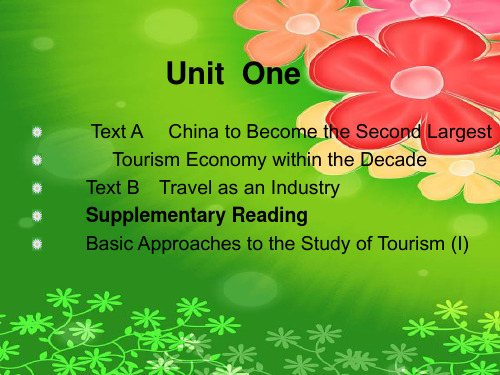
confine fare charter supply accessible location cruise excursion freighter ferry
v. n.
v. n.
adj. n. n.
n. n. v.
限制, 禁闭 费用, 旅客, 食物
租, 包(船、车等) 补给, 供给, 供应品
易接近的, 可到达的 位置, 场所, 特定区域 巡游, 巡航
Text B Travel as an Industry
Notes
Using smaller airplanes, air taxi companies fly passengers or supplies to destinations that may not be accessible to scheduled air carriers. 飞机出租公司用小型飞机把乘客或 货物运送到航空公司无法抵达的地方。 Oslo奥斯陆:是挪威首都和最大的城市。 1952年冬季奥林匹克运动会在此举行。
游览,短途旅行 货船 渡运, (乘渡船)渡过, 运送
Text B Travel as an Industry
riverboat
n.
内河船
underpinning n.
基础, 支柱, 支撑
rental
adj.
租用的
limousine
n.
豪华轿车
mass
adj.
大规模的, 集中的, 群众的
transit
Text A China to Become the Second
Largest Tourism Economy within the
Decade
Notes
《旅游英语》配套的课件Unit 1
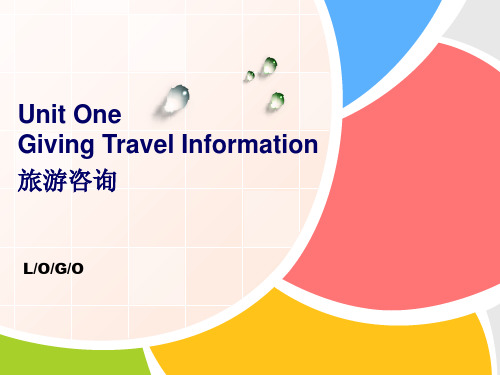
about travel information; • ——get some cultural knowledge about travel
information; • ——find ways to improve your writing skills
we’ll contact you by telephone. • 5. Will you please sign there, on _ the upper left-hand side_?
参考译文
• A:您好,要预订船票吗? • B:下星期有开往汉堡的船吗? • A:有,下星期三纽卡斯尔号将由南安普顿开往汉堡。 • B:好的,能给我订一间二人船舱吗? • A:我看一下。是的,可以〔指船舱位置图表〕这间怎么样? • B:这间很好,我订了。 • A:请您填好这张卡片。 • B:〔填好之后〕好了,给您。 • A:请您坐等一下,我来填写票单,只一会儿就好。 • B:那劳驾了。 • A:这是您的票。一共50英镑。 • B:给您钱。我们什么时间可以登船呢?您能告诉我怎么样登船吗?有登船专列吗?如果有的话,
Ming Tomb • 2. What are the characteristics of the landscape in Guilin? • The landscape is characterized by terraced rice paddies, water
buffalos, and bamboo groves, and peasants with turn up trousers and cone-shaped straw hats. • 3. Give a brief introduction to the Yangtze River. • Yangtze River is the largest river in China, the lifeline of China, which flows through nine provinces, with its 700 tributaries, covers an area of 1.8 million sq. km, which is 19 percent of the total area of China. • 4. Which city is known as the “City of the Sun〞? • Lhasa. • 5. What are the ancient mysteries of the Silk Road people can discover? • Bazaars where merchants haggle over camels and carpets, where you can meet the nomadic minorities of China, and
【旅游英语】Unit 1 Meeting the Guests
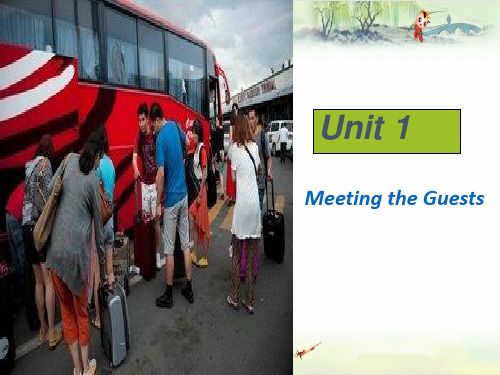
Notes Note 1 China International Tour Service (CITS) 中国国际旅行社
中国国际旅行社总社有限公司(China International Travel Service Limited, Head Office),前身中国国际旅行社总社(China International Travel Service Head office),英文 缩写:CITS,成立于1954年,是目前国内规模 最大、实力最强的旅行社企业集团,荣列国 家统计局公布的 " 中国企业500 强 " ,是500 强中唯一的旅游企业,现为中国国旅股份有 限公司旗下两大企业之一。
• C: Yes. I’m Lee White. This is Tom Bright. • A: Nice to meet you! I’m coming to meet you. Welcome you all to China. • B and C: Nice to meet you, too, Mr. Li. • A: Do you have all your luggage, Mr. White and Mr. Bright? • B: Yes, both of us only have a backpack. • A: Great. I believe you two will have a very pleasant stay here. • B: Thank you. • A: Our car is outside. Let’s drive straight to our hotel, shall we? • B: Excellent. Let’s go.
tour guide badge/ pass
旅游英语课件Unit 1 Travel and Tourism
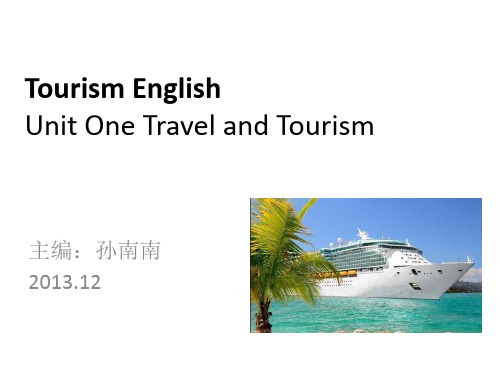
主编:孙南南 2013.12
Section A Passage Reading
Text A Travel Agency
Background Information:
1. Thomas Cook 近代旅游业之父 In 1841, as secretary of the South Midland Temperance
Section A Passage Reading
Text B Independent Travel
New Word: resident [ 'rezidənt ] n. 居民 bulk [ bʌlk ] n. 大部分,大块,容量 facility [ fə'siliti ] n. 设施,设备 book [ buk ] v. 预定,登记 at short notice 在短时间内,立刻 transfer [ træns'fə: ] n. 转让,转移,传递 baggage [ 'bægidʒ ] n. 行李
Package holidays are organized by a tour operator and sold to a consumer by a travel agent. Some travel agents are employees of tour operators, others are independent.
Association, Thomas Cook persuaded the Midland Countries Railway Company to run a special train between Leicester and Loughborough for a temperance meeting on July 5. He organized an excursion for his members at a fare of one shilling return. It turned out to be an immediate success—altogether 570 seats were sold. For his efforts Cook received a 5 percent commission. Although not the first excursion train run in England, it was believed to be the first publicly advertised excursion train organized by a middleman. Thus Thomas Cook ct rail excursion agent whose pioneering efforts were eventually to be copied widely in all parts of the world.
旅游英语教程 Unit 1
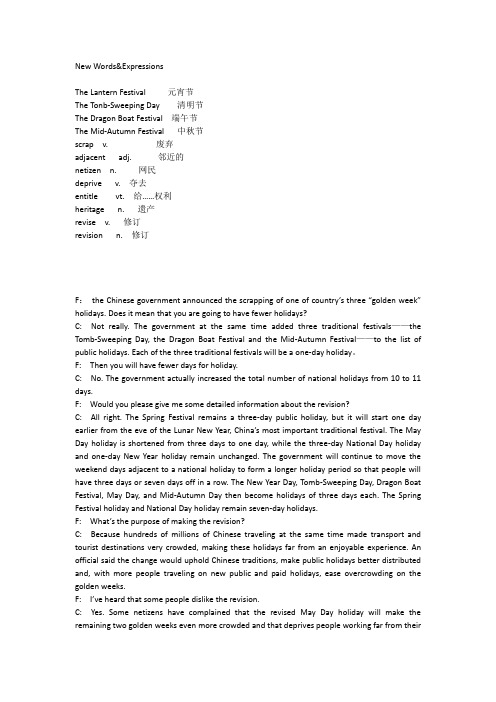
New Words&ExpressionsThe Lantern Festival 元宵节The Tonb-Sweeping Day 清明节The Dragon Boat Festival 端午节The Mid-Autumn Festival 中秋节scrap v. 废弃adjacent adj. 邻近的netizen n. 网民deprive v. 夺去entitle vt. 给……权利heritage n. 遗产revise v. 修订revision n. 修订F:the Chinese government announced the scrapping of one of country’s three “gol d en week” holidays. Does it mean that you are going to have fewer holidays?C: Not really. The government at the same time added three traditional festivals——the Tomb-Sweeping Day, the Dragon Boat Festival and the Mid-Autumn Festival——to the list of public holidays. Each of the three traditional festivals will be a one-day holiday。
F: Then you will have fewer days for holiday.C: No. The government actually increased the total number of national holidays from 10 to 11 days.F: Would you please give me some detailed information about the revision?C: All right. The Spring Festival remains a three-day public holiday, but it will start one day earlier from the eve of the Lunar New Year, China’s most important traditional festival. The May Day holiday is shortened from three days to one day, while the three-day National Day holiday and one-day New Year holiday remain unchanged. The government will continue to move the weekend days adjacent to a national holiday to form a longer holiday period so that people will have three days or seven days off in a row. The New Year Day, Tomb-Sweeping Day, Dragon Boat Festival, May Day, and Mid-Autumn Day then become holidays of three days each. The Spring Festival holiday and National Day holiday remain seven-day holidays.F: What’s the purpose of making the revision?C: Because hundreds of millions of Chinese traveling at the same time made transport and tourist destinations very crowded, making these holidays far from an enjoyable experience. An official said the change would uphold Chinese traditions, make public holidays better distributed and, with more people traveling on new public and paid holidays, ease overcrowding on the golden weeks.F: I’ve heard that some people dislike the revision.C: Yes. Some netizens have complained that the revised May Day holiday will make the remaining two golden weeks even more crowded and that deprives people working far from theirhometowns of the chance to go back home for family gatherings. They have even voiced their worry that a lot of company employees will not be off on the newly-added traditional festival holidays.F: Does the government know that?C: Yes. The spokesman said the revision could not satisfy all the people, whose interests might vary, but did respect the opinion of a majority. He said that 75 percent of the people were in favor of the change and that 60 percent of the netizens agreed to the way the May Day holiday was revised.F: I had paid holidays when I worked in my country. Do people have paid holidays in China? C: Yes. All employees of government agencies, enterprise and public-service institutions are entitled to take paid holidays after serving the same employer for one year. Employees who have worked for ten to 19 years will have ten days and those who have worked for 20 years and above would have 15 days.F: That’s wonderful.。
《旅游英语》第一章Travel Arrangement
2 Task Description
8
I Task Description
Discussion: 1. As a tour guide , how would you begin your work when you get the reception program from the travel agency? Dou you know the full form of CITS?
program from the travel agency. Making tour arrangements as following:
The four-day travel in Shanxi.
2. Could you list the tourist sites mentioned in this passage?
Mount Wutaishan, Yungang Grottoes, the Pingyao Ancient City
9
Ⅱ Task Description
China International Travel Service
tour guide
coach
itinerary
10
Ⅱ Task Description As a tour guide, you begin your work when you get the reception
houses in northern China. From this tour, you will appreciate the beautiful landscape
in Shanxi. In _a_d__d_i_t_i_o_n__, you will get to know a little about Buddhism and its culture. You will also appreciate the classic folk houses, which may v__a_r_y_______ from those south of the Yangtze River, and u_n__d_e__r_s_t_a_n_dMerchant Culture of Shanxi, which exerted a great __in__f_lu__e_n__c_eon the Chinese modern history. So the four-day tour will give you a glimpse of many __a_s_p_e__c_t_s__ of Chinese culture.
新职业英语旅游英语Unit 1 ppt课件
旅游 Unit 1 Marketing and Preliminary Work 英语
Task 12
旅游 Unit 1 Marketing and Preliminary Work 英语
Task 1 Being a tour guide, you should know what to prepare before
旅游 Unit 1 Marketing and Preliminary Work 英语
Reading A
Task 1 Match each type of tourism with its corresponding picture.
Try to describe them in English briefly.
(c)— Agritourism: It is the practice of attracting travelers or visitors to an area or areas used primarily for agricultural purposes.
旅游 英语
T Unit 1 Marketing and Preliminary Work
Reading A
2. timeshare
A timeshare is a form of ownership or right to the use of a property. The property is typically in a resort area, and multiple parties hold rights to use it. Each sharer is allotted a period of time (typically one week, and almost always the same time every year) in which they may use the property.
旅游英语Unit+1+Tourism+and+Tour+Guides4
Professionalism
• represent not only your personal appearance and behavior but that of your company as well as your country. • depend on the way you dress yourself, your ability to use and understand languages, your manners and social skills and your attitude toward your work and the people you are providing services to. In general , your professionalism is your appropriate behavior when you are conducting a tour.
• A Teacher
• help inbound tourists learn and understand the history, culture, traditions and important ideas of your city as well as China.
• An Entertainer
• Jobs done by Tour Guides
• navigating, communicating, interpreting, rolemodeling appropriate behavior, entertaining, treating injury, ensuring safety, managing disasters etc.
• make yourself a humorous entertainer, not a stage actor but a friendly, active, high-spirited person to help your guests enjoy their travel.
旅游英语第一章
授课教师:王瑞仙
Arrangement
• Tourist English • Hotel English
Unit 1
Dialogs
1. Passport, please!
• economic reform • 经济改革 • open-up policy • 对外开放政策 • Sorry to have kept you waiting. • How long do you plan to stay?
• Please assure your friends that I’ll be doing all that is within my power to make your visit in shanghai a pleasant experience.
• Thank you for your understanding and cooperation.
• belong • finalize • actualization • ample • pious • enviable • affluent
• 为…所有,是…的成员 • 把…最后定下来 • 实现,现实化 • 足够的,充分的 • 虔诚的,信奉宗教 • 值得羡慕的 • 丰富的,富裕的
Useful expressions
• To be the first to go to an exotic place, or to go where certain types
of people go, offers some excitement and creates an illusion of enviable sophistication among one’s friends.
- 1、下载文档前请自行甄别文档内容的完整性,平台不提供额外的编辑、内容补充、找答案等附加服务。
- 2、"仅部分预览"的文档,不可在线预览部分如存在完整性等问题,可反馈申请退款(可完整预览的文档不适用该条件!)。
- 3、如文档侵犯您的权益,请联系客服反馈,我们会尽快为您处理(人工客服工作时间:9:00-18:30)。
旅游英语教程
修月祯 主 编
Unit 1 Tourism Industry and Tourists
Part I Listening and Speaking
❖ Passage 1
New Words & Expressions
Chinese Lunar New Year reservation n. analyst n. appreciation n. venture v. outbound adj. China’s Exit-Entry Bureau inbound adj. year-on-year
喜欢的人(或物) 教师在班里不应该偏爱某些学生。
❖ Dialog
New Words & Expressions
the Lantern Festival the Tomb-Sweeping Day the Dragon Boat Festival the Mid-Autumn Festival scrap v. adjacent adj. netizen n. deprive v. entitle vt. heritage n. revise v. revision n.
n. 残留物 遗体
The remains of the meal are[is] in the refrigerator. 剩饭在冰箱里。
To pay respect to the remains of sb. 瞻仰遗容
far from 远离(某地) 远不是
people working far from their hometowns 远离家乡工作的人
陈规的,典型的 连续的 住宅,家 国内旅游(一国居民在本国内旅游) 入境旅游 出境旅游 境内旅游(国内旅游加上入境旅游) 国家旅游(国内旅游加上出境旅游) 国际旅游(入境旅游加上出境旅游)
❖ Treasure Box
I have an open ticket. Now I want to make airline
Part II Reading
❖ Text A
New Words & Expressions
acquisition n. motivation n. exploration n. emerge v. domesticate v.
stabilize v. accommodation n. establishment n. retail n. hospitality n. temporary adj. destination n. undertake v.
Mathieson and Wall (1982)(2) created a good working definition of tourism as “the temporary movement of people to destinations outside their normal places of work and residence, the activities undertaken during their stay in those destinations, and the facilities created to cater to(3) their needs.”
The show was far from being a failure; it was a great
success. 这个表演不仅没有失败,而且是很成功的。
entitle v. 给…… 题名,给予……权利
be entitled to do sth. 被赋予……权利
be entitled to sth. 被赋予……权利
Any attempt to define tourism and to describe its scope fully must consider the various groups that participate in and are affected by this industry. Their perspectives are vital to the development of a comprehensive definition. Four different perspectives of tourism can be identified:
I have no reservation about hiring him. 雇用他我没有任何意见。
I am willing to agree to the proposal with one reservation. 我很同意这个建议,但有一点保留意见。
保留区
The military reservation was five miles away from here. 军事保留地距离这里五英里。
Tourism is a collection of activities, services and industries that delivers a travel experience, including transportation, accommodations, eating and drinking establishments, retail shops, entertainment businesses, activity facilities and other hospitality services provided for individuals or groups traveling away from home.
获得 动机 探险,探索 出现,形成 驯养
稳定 住宿 公司,企业 零售 殷勤好客 暂时的,临时的 目的地 承担
❖ New Words & Expressions
cater v. host v. & n. psychic adj. jurisdiction n. expenditure n. imprecise adj. subset n. exertion n. hybrid n. facet n. trekking n. alternative adj. sustainable adj. consumptive adj. tangible adj. artifact n. backpacking n.
When you say blue is your favorite color, you can say blue
favorite adj.
喜欢的,中意的
is your color. 蓝色是你最喜欢的颜色,可以说,蓝色是你的颜色。
n.
A teacher shouldn’t have favorites in the class.
According to Macintosh and Goeldner (1986)(4) tourism is “the sum of the phenomena and relationships arising from(5) the interaction of tourists, business suppliers, host(6) governments and host communities in the process of attracting and hosting these tourists and other visitors.”
迎合,投合 做主人招待;主人 精神的,心灵的 管辖区 花费,开销 不精确的 子集 努力,尽力
混合物 (事物的)方面 长途跋涉 选择性的 可持续的 消费的,消耗性的 可触知的 人造物品 背着包徒步旅行
Tourism
Since the beginning of time humans have traveled. Food, water, safety or acquisition of resources (trade) were the early travel motivations. But the idea of travel for pleasure or exploration soon emerged. Travel has always depended upon technology to provide the means or mode of travel(1). The earliest travelers walked or rode domesticated animals. The invention of the wheel and the sail provided new modes of transportation. Each improvement in technology increased individuals’ opportunities to travel. As roads were improved and governments stabilized, interest in travel increased for education, sightseeing, and religious purposes.
Every child in China is entitled to compulsory education at school. 在中国,每一个孩子都有接受义务教育的权利。
❖ Notes
(1) adjacent to 邻近的 (2) in a row 连续
(3) …deprives people working far from their hometowns of the chance to go back home for family gathering. deprives sb. of sth. 剥夺某人 做某事的权利
What is your judgment on…? revise the holidays.)
